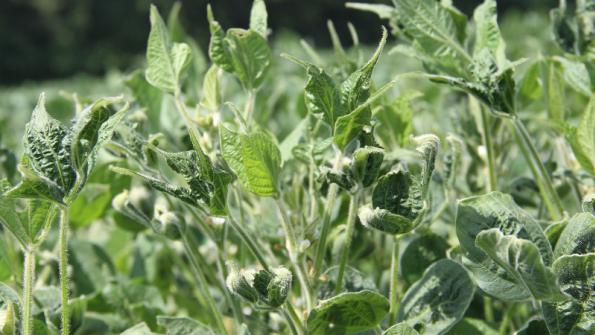
As July draws to a close, even with a ban on dicamba, drift complaints now number around 700 in Arkansas. Around the Mid-South, concerns over the spraying of dicamba-tolerant crops haven’t abated.
On Wednesday (July 20), BASF representatives Dan Westburg and Gary Schmitz spoke with Delta Farm Press about the company’s approach to the situation. The company’s new dicamba formulation, Engenia, has been touted as less likely to cause off-target damage and was studied by University of Arkansas researchers prior to the 2017 cropping season.
Other dicamba formulations aimed at use on Xtend soybeans and cotton include Monsanto’s XtendiMax, which was not tested by university researchers in-state and was unapproved for use in 2017. Now, all formulations have been effectively banned from the state – except for use on pastures -- for the balance of the year.
“Over the last two years prior to the registration of Engenia, we did make the product available to all the weed scientist university researchers to test in their own trials,” said Westburg, who repeatedly touted the importance of applicator training in use of the Xtend system.
Class-action lawsuits by aggrieved producers with damaged crops have either been filed or are being prepared against both Monsanto and BASF.
After allowing research to be conducted on their products and cooperating with product studies, is there any frustration BASF has with being tethered to Monsanto?
“I can’t speak to Monsanto’s decision process or their approach to it. What I can say is BASF has been very committed to working with – especially two years out, in some cases, three – those individuals. (We were) working with universities to refine the efficacy programs that we needed to each individual area so we had it fine-tuned for the issues they’d encounter.
“We also worked with a few people, as well, to really … demonstrate what our product was capable of. We’ll continue to engage with key influencers, whether state regulators or university Extension research, consultants and others, to get the message out and educate on the proper use of Engenia in dicamba-tolerant crops.
“I feel it’s absolutely critical we have this as part of the system. The PPO-resistance in some of those areas is so rampant, if we over-rely on Liberty only it’s not going to last long. We need this tool and growers need this choice to … utilize.
“We’ll continue to work with key influencers and others to educate on the proper use.”
Weed scientists argue the topography is so different and the way farms are laid out, especially in northeast Arkansas, they needed the new formulations to experiment with and check. Does BASF agree with claims the Mid-South unique farming landscape must be a chief consideration for such weed-control technologies going forward?
“A lot of the testing the University of Arkansas did was at the Keiser Research Station, right in that neck of the woods. The uniqueness of the topography, I think, contributes to the distance that, perhaps, an inversion can meander and move around.
“From a cropping system standpoint, here in North Carolina, we’re not going to have the massive fields they have (in east Arkansas) … but the cropping systems, other than rice, are amazingly similar. We have a tremendous number of dicamba-tolerant soybeans and cotton planted this year and treated. We have peanuts mixed in, we’ve got corn mixed in, and a lot of non-dicamba-tolerant soybeans.”
The upper Mid-South is “the first area of the country where I’ve really encountered, maybe not a standard practice, but a common practice where nighttime applications are done. I think that’s a key concern for that given area.”
What about Missouri specifically?
“We did work with (University of Missouri weed scientist) Kevin Bradley…I know we did efficacy work with him. I don’t know we did any other off-target work with him but I know he’s doing some now.
“The work that was developed or done in Keiser, Ark., … the environment there is a carbon-copy of what we’d encounter in the Bootheel.”
About the Author(s)
You May Also Like




